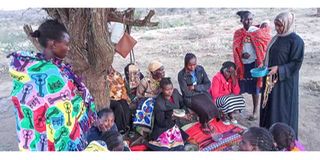Graduate returns to village in selfless bid to empower women

Fardosa Hassan (right) engages members of Lekiji Women Initiative in Laikipia North.
What you need to know:
- Ms Hassan retreated to Lekiji Village and initiated a programme to give back to society and empower women and girls.
- The number of members was initially higher but reduced as most members were battered by their husbands and coerced into withdrawing.
- Early marriages and female genital mutilation have, over the years, prevented girls from pursuing education; most girls are married off at a tender age and their academic dreams shattered.
After Fardosa Hassan graduated from Karatina University with a Bachelor of Education degree, she retreated to Lekiji village in Laikipia North, and initiated a women’s empowerment programme.
Having been born and raised in the cosmopolitan village, the 26-year-old was determined to fight enslaving cultural practices like early marriages and female genital mutilation (FGM), which have, over the years, prevented girls from pursuing education. Most girls are married off at a tender age and their academic dreams shattered.
Chauvinism
Male chauvinists in the area denied their wives the chance to engage in income-generating activities. And so in 2019, Ms Hassan formed the Lekiji Women Initiative, which involves about 60 women in beadwork.
The number was higher at the beginning but reduced as most members were battered and coerced by their husbands into withdrawing.
Some persevered and their men can now appreciate their efforts. The group meets three times a week at the Lekiji Cultural Manyatta Centre, where Ms Fardosa engages them in a mentorship and entrepreneurship programme.
They learn how to bead artefacts, which they sell and use the revenue to meet their family needs and support girls’ education.
“This programme is meant to enlighten the community on the importance of girls’ education. If you empower women, then the entire community is empowered. The women in this village are unemployed and have been restricted by their husbands against joining the group. The men fear that their wives would gain exposure and be economically empowered,” Ms Fardosa says.
“When we started, we had huge membership but the number reduced drastically because of persistent threats from their husbands. Some members end up giving all their income to their husbands because of the fear of being battered or ousted from the homestead.”
Covid-19 effects
The cultural centre was established in 2019, but its operations came to a halt at the height of the Covid-19 crisis.
“I am grateful because my husband has allowed me to participate in the activities of this ambitious group. We have been able to educate our children together and grow economically. I am looking forward to advancing more,” says Mary, not her real name, as she sought anonymity.
The village is situated at the confluence of the Ewaso Nyiro and Nanyuki rivers on 1,200 acres between Mpala Research Centre and Ol Jogi wildlife conservancy. It is also a wildlife corridor.
The group aims at availing itself of the opportunities provided by international and local tourists visiting Ol Jogi and Mpala. Ms Fardosa is currently the operations assistant at Mpala Research Centre.
Scholarship
She is a beneficiary of the centre’s social responsibility programme. After completing her Form Four education at St Francis Girls High School, Doldol, she was enrolled in a scholarship programme by the centre to pursue her education at Karatina University.
“I am keen on mentoring young girls to reduce cases of school dropouts due to teenage pregnancies, poverty and cultural practices like FGM. I am grateful for the support I received from my family and Mpala. I am currently catering for my younger sister’s education,” Ms Fardosa says.
So far, she says, the Lekiji Women Initiative has sponsored two secondary schoolgirls from the community.
“We plan to open a savings account so that the group can have easy access to loans to expand their ventures. We also plan to open an online shop to sell our products to our clients across the globe. We channel the funds we get from the beadwork activity towards supporting girls’ education,” she says.
“About 98 per cent of girls in this village do not get the opportunity to further their education after completing the primary level due to poverty in the area and also cultural beliefs. In future, I am looking forward to coming up with a programme that will empower boys too.”
Governors' wives
Meanwhile, the County First Ladies Association has raised an eyebrow over the rise of teenage pregnancies in Laikipia County. The association’s chairperson Maria Mbeneka argues that parents have abandoned their role of mentoring teenage boys and girls about their sexuality.
According to statistics gathered from the Laikipia Health Service, 15,015 girls aged between 10 and 19 years have conceived in the last three years and are currently young mothers.
Of the 15,015 cases, 5,506 were reported in 2019; 5,489 in 2020; and 4,020 in 2021.
The data was gathered by the county government in partnership with the Kenya National Bureau of Statistics (KNBS). It further shows that there were 1,618 abortions in 2018, 1,525 in 2019 and 1,492 in 2020. This is according to the cases that were reported in public health centres.





